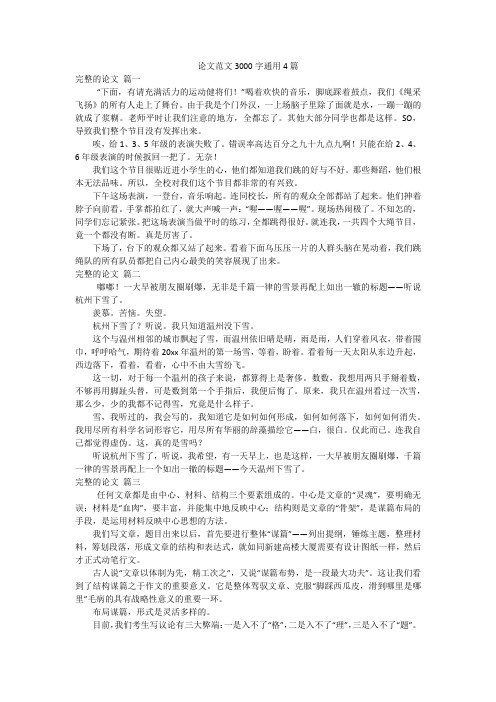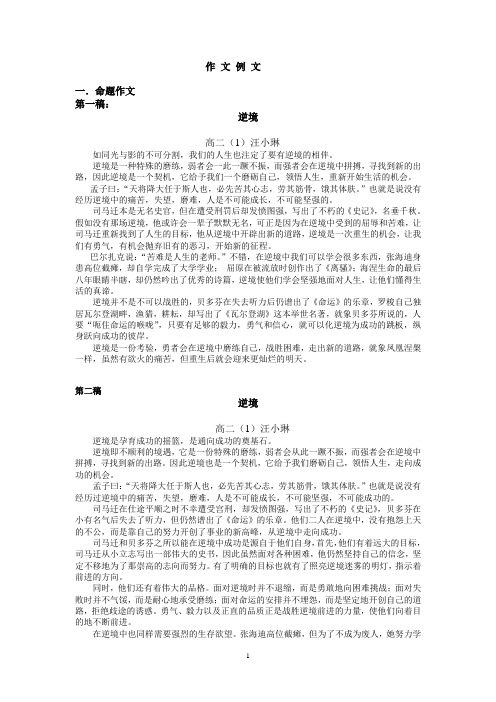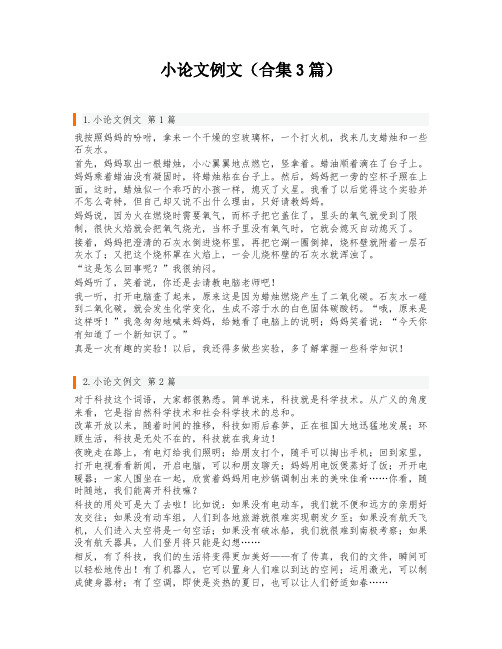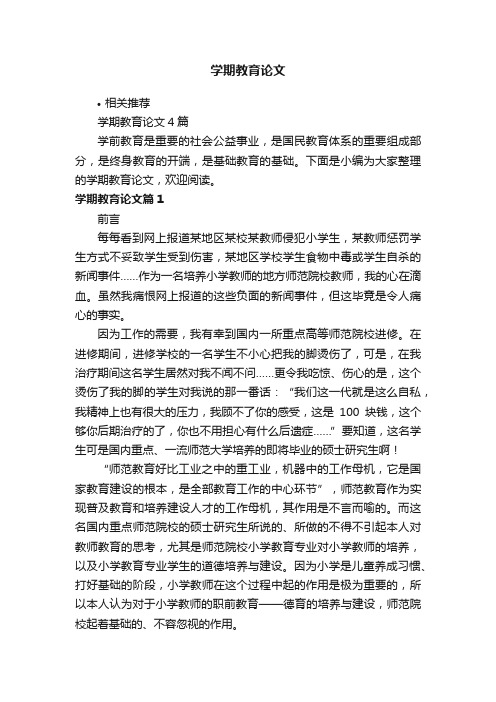学期论文例文
论文范文3000字通用4篇

论文范文3000字通用4篇完整的论文篇一“下面,有请充满活力的运动健将们!”喝着欢快的音乐,脚底踩着鼓点,我们《绳采飞扬》的所有人走上了舞台。
由于我是个门外汉,一上场脑子里除了面就是水,一蹦一蹦的就成了浆糊。
老师平时让我们注意的地方,全都忘了。
其他大部分同学也都是这样。
SO,导致我们整个节目没有发挥出来。
唉,给1、3、5年级的表演失败了。
错误率高达百分之九十九点九啊!只能在给2、4、6年级表演的时候扳回一把了。
无奈!我们这个节目很贴近进小学生的心,他们都知道我们跳的好与不好。
那些舞蹈,他们根本无法品味。
所以,全校对我们这个节目都非常的有兴致。
下午这场表演,一登台,音乐响起。
连同校长,所有的观众全部都站了起来。
他们抻着脖子向前看。
手掌都拍红了,就大声喊一声:“喔——喔——喔”。
现场热闹极了。
不知怎的,同学们忘记紧张。
把这场表演当做平时的练习,全都跳得很好。
就连我,一共四个大绳节目,竟一个都没有断。
真是厉害了。
下场了,台下的观众都又站了起来。
看着下面乌压压一片的人群头脑在晃动着,我们跳绳队的所有队员都把自己内心最美的笑容展现了出来。
完整的论文篇二嘟嘟!一大早被朋友圈刷爆,无非是千篇一律的雪景再配上如出一辙的标题——听说杭州下雪了。
羡慕。
苦恼。
失望。
杭州下雪了?听说。
我只知道温州没下雪。
这个与温州相邻的城市飘起了雪,而温州依旧晴是晴,雨是雨,人们穿着风衣,带着围巾,呼呼哈气,期待着20xx年温州的第一场雪,等着,盼着。
看着每一天太阳从东边升起,西边落下,看着,看着,心中不由大雪纷飞。
这一切,对于每一个温州的孩子来说,都算得上是奢侈。
数数,我想用两只手掰着数,不够再用脚趾头替,可是数到第一个手指后,我便后悔了。
原来,我只在温州看过一次雪,那么少,少的我都不记得雪,究竟是什么样子。
雪,我听过的,我会写的,我知道它是如何如何形成,如何如何落下,如何如何消失。
我用尽所有科学名词形容它,用尽所有华丽的辞藻描绘它——白,很白。
议论文作文例文

作文例文一.命题作文第一稿:逆境高二(1)汪小琳如同光与影的不可分割,我们的人生也注定了要有逆境的相伴。
逆境是一种特殊的磨练,弱者会一此一蹶不振,而强者会在逆境中拼搏,寻找到新的出路,因此逆境是一个契机,它给予我们一个磨砺自己,领悟人生,重新开始生活的机会。
孟子曰:“天将降大任于斯人也,必先苦其心志,劳其筋骨,饿其体肤。
”也就是说没有经历逆境中的痛苦,失望,磨难,人是不可能成长,不可能坚强的。
司马迁本是无名史官,但在遭受刑罚后却发愤图强,写出了不朽的《史记》,名垂千秋。
假如没有那场逆境,他或许会一辈子默默无名,可正是因为在逆境中受到的屈辱和苦难,让司马迁重新找到了人生的目标,他从逆境中开辟出新的道路,逆境是一次重生的机会,让我们有勇气,有机会抛弃旧有的恶习,开始新的征程。
巴尔扎克说:“苦难是人生的老师。
”不错,在逆境中我们可以学会很多东西,张海迪身患高位截瘫,却自学完成了大学学业;屈原在被流放时创作出了《离骚》;海涅生命的最后八年眼睛半瞎,却仍然吟出了优秀的诗篇,逆境使他们学会坚强地面对人生,让他们懂得生活的真谛。
逆境并不是不可以战胜的,贝多芬在失去听力后仍谱出了《命运》的乐章,罗梭自己独居瓦尔登湖畔,渔猎,耕耘,却写出了《瓦尔登湖》这本举世名著,就象贝多芬所说的,人要“呃住命运的喉咙”,只要有足够的毅力,勇气和信心,就可以化逆境为成功的跳板,纵身跃向成功的彼岸。
逆境是一份考验,勇者会在逆境中磨练自己,战胜困难,走出新的道路,就象凤凰涅槃一样,虽然有欲火的痛苦,但重生后就会迎来更灿烂的明天。
第二稿逆境高二(1)汪小琳逆境是孕育成功的摇篮,是通向成功的奠基石。
逆境即不顺利的境遇,它是一份特殊的磨练,弱者会从此一蹶不振,而强者会在逆境中拼搏,寻找到新的出路。
因此逆境也是一个契机,它给予我们磨砺自己,领悟人生,走向成功的机会。
孟子曰:“天将降大任于斯人也,必先苦其心志,劳其筋骨,饿其体肤。
”也就是说没有经历过逆境中的痛苦,失望,磨难,人是不可能成长,不可能坚强,不可能成功的。
大学生学年论文范文(共4篇)

“作为新世纪的大学生,是我们最先触碰到时代的前沿;也是我们,心跳和着民族的脉搏;更是我们该去担起建设有中国特色的社会主义、实现中华民族伟大复兴的历史使命。
”大学生是社会的新鲜血液,大学生的综合素质的高低影响着社会的发展,而学校是培养大学生的主要基地,所以大学生的校园生活在很大程度上影响着大学生各方面能力的培养,为了更好的了解当代大学生的校园生活情况,我调查小组特作此调查!数学学业不良是一个相对长期的过程。
学生由于在以前的学习中屡遭失败,使他们心灵上受到严重的“创伤”,存在着一种失败者的心态,学习自信心差。
教师只有充分相信学生发展的可能性,帮助学生不断成功,提高学生自尊自信的水平,逐步转变失败心态,才能形成积极的自我学习、自我教育的内部动力机制。
如实施成功教育,创设成功教育情境,为学业不良学生创造成功的机会。
事实上,每个学业不良学生都有自己的理想和抱负,只不过因各种原因冲淡而已。
因此,教师必须引导学业不良学生在教师的“成功圈套”中获得能够实现愿望的心理自我暗示效应,从而产生自信心,进而感到经过努力,自己完全可以实现自己的抱负,达到转化数学学业不良学生的目的。
高校德育坚持以人为本理念的目的就是促进大学生的道德成长,帮助大学生体认生活的意义和生命的价值,提升大学生的德性品质和精神世界。
既然德育是为人的,就必须关照学生生活世界,特别是在工具理性日益张扬、价值理性受到压抑的现时代,德育回归生活世界的意义更加凸显。
总之,德育以生活为起点,以生活为归属,教育学生在社会生活中立身处世,学会做人,这是教育的根本目的,更是生活德育的终极关怀。
衷心感激我的导师__教授对本论文的指导。
本研究方向其实是_教师“忍痛割爱”帮我确定的,他敏锐地觉察到对生命价值进行研究的理论意义和现实需要,所以引导笔者进入此领域之时,其实也带着他本人对该研究的理论兴奋。
_教师将许许多多完全能够、也完全应当由自我撰文着书的观点和材料倾囊相授于我,并对本论文进行了不遗余力的指导。
小论文例文(合集3篇)

小论文例文(合集3篇)1.小论文例文第1篇我按照妈妈的吩咐,拿来一个干燥的空玻璃杯,一个打火机,找来几支蜡烛和一些石灰水。
首先,妈妈取出一根蜡烛,小心翼翼地点燃它,竖拿着。
蜡油顺着滴在了台子上。
妈妈乘着蜡油没有凝固时,将蜡烛粘在台子上。
然后,妈妈把一旁的空杯子照在上面。
这时,蜡烛似一个乖巧的小孩一样,熄灭了火星。
我看了以后觉得这个实验并不怎么奇特,但自己却又说不出什么理由,只好请教妈妈。
妈妈说,因为火在燃烧时需要氧气,而杯子把它盖住了,里头的氧气就受到了限制,很快火焰就会把氧气烧光,当杯子里没有氧气时,它就会熄灭自动熄灭了。
接着,妈妈把澄清的石灰水倒进烧杯里,再把它涮一圈倒掉,烧杯壁就附着一层石灰水了;又把这个烧杯罩在火焰上,一会儿烧杯壁的石灰水就浑浊了。
“这是怎么回事呢?”我很纳闷。
妈妈听了,笑着说,你还是去请教电脑老师吧!我一听,打开电脑查了起来,原来这是因为蜡烛燃烧产生了二氧化碳。
石灰水一碰到二氧化碳,就会发生化学变化,生成不溶于水的白色固体碳酸钙。
“哦,原来是这样呀!”我急匆匆地喊来妈妈,给她看了电脑上的说明;妈妈笑着说:“今天你有知道了一个新知识了。
”真是一次有趣的实验!以后,我还得多做些实验,多了解掌握一些科学知识!2.小论文例文第2篇对于科技这个词语,大家都很熟悉。
简单说来,科技就是科学技术。
从广义的角度来看,它是指自然科学技术和社会科学技术的总和。
改革开放以来,随着时间的推移,科技如雨后春笋,正在祖国大地迅猛地发展;环顾生活,科技是无处不在的,科技就在我身边!夜晚走在路上,有电灯给我们照明;给朋友打个,随手可以掏出手机;回到家里,打开电视看看新闻,开启电脑,可以和朋友聊天;妈妈用电饭煲蒸好了饭;开开电暖器;一家人围坐在一起,欣赏着妈妈用电炒锅调制出来的美味佳肴……你看,随时随地,我们能离开科技嘛?科技的用处可是大了去啦!比如说:如果没有电动车,我们就不便和远方的亲朋好友交往;如果没有动车组,人们到各地旅游就很难实现朝发夕至;如果没有航天飞机,人们进入太空将是一句空话;如果没有破冰船,我们就很难到南极考察;如果没有航天器具,人们登月将只能是幻想……相反,有了科技,我们的生活将变得更加美好——有了传真,我们的文件,瞬间可以轻松地传出!有了机器人,它可以置身人们难以到达的空间;运用激光,可以制成健身器材;有了空调,即使是炎热的夏日,也可以让人们舒适如春……不难看出:这一切,人们享用的都是科技的成果!由此可知:科技,帮助我们创造了优越的生活环境;科技,提高了我们的生活质量;科技,是全世界人们智慧的结晶!我们身处科技中,要不断学习新的科技!科技就在我们身边,我们还要大力发展科技!3.小论文例文第3篇在烧纸船的实验中纸船里的水会怎样?纸船又会怎样?记得有一个星期的星期四下午第三节课,我们在上科学课,在科学课上,我们做了小实验,实验的方法就是:在三角架上放了一张白纸做的纸船,在纸船里倒上一定的水,最后把酒精灯轻轻地移到三角架下,纸船里的水会怎样?纸船又会怎样?同学们议论纷纷。
学年论文模板范文

标题:xxx(根据论文具体内容自行命名)
摘要:
本论文主要研究xxx(论文研究的问题、目的和方法等)。
通过对相
关文献的综述和实证研究的分析,得出了以下结论:1)xxx;2)xxx;3)xxx。
本研究对于解决xxx问题有一定的理论和实践价值。
关键词:xxx、xxx、xxx(根据论文具体内容自行设置关键词)
引言:
(1)背景介绍:对论文研究的问题或主题进行简要介绍,说明其理
论和实践意义。
(2)研究目的和意义:明确研究目的和意义,解释为何进行该研究。
文献综述:
(1)相关理论:对该领域相关理论进行综述,介绍前人的研究成果
和理论基础。
(2)研究现状:概括目前国内外关于该领域相关研究的主要研究方
法和结果。
方法:
(1)研究设计:阐述研究方法和研究设计,包括研究对象、数据源、研究工具等。
(2)数据分析:介绍研究数据的收集和分析方法。
结果与讨论:
(1)结果呈现:根据数据分析结果,简明扼要地描述实证研究的结果。
(2)讨论分析:对结果进行详细讨论,并与前人研究进行比较、分析。
结论:
总结研究所得出的结果,提出对该领域的启示和建议,以及进一步研究的展望。
列举本文中所引用的相关文献,格式要符合学术规范。
附录:
(例:问卷调查原始数据、图片、图表等)
以上为一个学年论文模板的框架,具体内容可根据论文的实际主题和要求进行调整和补充。
希望对你的学年论文写作有所帮助!。
本科生论文范文(通用7篇)

本科生论文范文1通过这一阶段的努力,我的毕业论文《某某某》终于完成了,这意味着大学生活即将结束。
在大学阶段,我在学习上和思想上都受益非浅,这除了自身的努力外,与各位老师、同学和朋友的关心、支持和鼓励是分不开的。
在本论文的写作过程中,我的导师某某老师倾注了大量的心血,从选题到开题报告,从写作提纲,到一次又一遍地指出每稿中的具体问题,严格把关,循循善诱,在此我表示衷心感谢。
同时我还要感谢在我学习期间给我极大关心和支持的各位老师以及关心我的同学和朋友。
写毕业论文总结报告是一次再系统学习的过程,毕业论文答辩自述的完成,同样也意味着新的学习生活的开始。
我将铭记我曾是一名某某学子,在今后的工作中把某某的优良传统发扬光大。
感谢各位专家的批评指导。
本科生论文范文2通过这一阶段的努力,我的毕业论文《某某某》终于完成了,这意味着大学生活即将结束。
在大学阶段,我在学习上和思想上都受益非浅,这除了自身的努力外,与各位老师、同学和朋友的关心、支持和鼓励是分不开的。
在本论文的写作过程中,我的导师某某老师倾注了大量的心血,从选题到开题报告,从写作提纲,到一次又一遍地指出每稿中的具体问题,严格把关,循循善诱,在此我表示衷心感谢。
同时我还要感谢在我学习期间给我极大关心和支持的各位老师以及关心我的同学和朋友。
写毕业论文总结报告是一次再系统学习的过程,毕业论文答辩自述的完成,同样也意味着新的学习生活的开始。
我将铭记我曾是一名某某学子,在今后的工作中把某某的优良传统发扬光大。
感谢各位专家的批评指导。
本科生论文范文3致谢三年的学习生活即将结束,回顾三年的学习生活,感受颇深,收获丰厚。
在论文的写作过程中,有很多困难,无论是在理论学习阶段,还是在论文的选题、资料查四询、开题、研究和撰写的每一个环节,无不得到导师的悉心指导和帮助。
借此机会我向导师表示衷心的感谢!同时,我要感谢陕西职业技术学院授课的各位老师,正是由于他们的传道、授业、解惑,让我学到了专业知识,并从他们身上学到了如何求知治学、如何为人处事。
三年级语文论文范文(11篇)

三年级语文论文范文第1篇一个学期的教育教学工作已经结束了,回顾这一学期以来,在学校**的大力**和直接* *下,在各科任老师和家长的积极配合和耐心帮助下,圆满地完成了教育教学工作任务,我担任的语文学科也取得了一定的成绩,现将具体工作总结如下:一、激发学生学习兴趣,提高学生语文素养语文学科是一门充满思想、充满人文精神、充满智慧的学科。
在新课改的大背景中,学生的自主学习,培养学生的创新能力,已成为教师关注的热点,讨论、交流、探究等学习方式已成为课堂的主流。
在课堂教学中,我力求做到让学生变得鲜活,让学生学得兴致盎然,使学生在语文学习中享受学习的乐趣,从而发展学生的语文素养。
1、注意新课导入新颖。
“兴趣是最好的老师”。
在教学中,我十分注重培养和激发学生的学习兴趣。
譬如,在导入新课,让学生一上课就能置身于一种轻松**的环境氛围中,而又不知不觉地学语文。
我们要根据不同的课型,设计不同的导入方式。
可以用多* *展示画面让学生入情景;也可用讲述故事的方式导入,激发兴趣、设计悬念……引发设计,比起简单的讲述更能激发学生的灵性,开启学生学习之门。
2、培养积极探究习惯,发展求异思维能力。
在语文教学中,阅读者对语言意义、语言情感、语言技巧的感悟,在很大程度上与学生的生活经历、知识积累、认识能力、理解水*有关。
为此,在语文教学中,构建语义的理解、体会,要引导学生仁者见仁,智者见智,大胆,各抒己见。
在思考辩论中,教师穿针引线,巧妙点拨,以促进学生在激烈的争辩中,在思维的碰撞中,得到语言的升华和灵性的开发。
教师应因势利导,让学生对问题充分思考后,学生根据已有的经验,知识的积累等发表不同的见解,对有分歧的问题进行辩论。
通过辩论,让学生进一步认识了自然,懂得了知识无穷的,再博学的人也会有所不知,体会学习是无止境的道理。
二、重视朗读品评感悟,让课堂教学“活”起来。
小学语文课本中的每一篇课文都是文质兼美的佳作,其语境描述的美妙,语言运用的精妙,思想表达的深邃,见解阐述的独到,都是引导学生感悟的重要内容。
本科大学论文范文3篇

本科⼤学论⽂范⽂3篇应⽤型本科⼤学⽣就业论⽂⼀、⼤学⽣科学就业观的现状及原因(⼀)基层就业意识淡薄,就业⾸选沿海⼤城市当前,我国各地区之间的发展还⼗分不平衡,⼀线城市如北京、上海以及沿海发达地区则更加吸引⼤学⽣的关注。
“不少学⽣由于在就业过程中对就业形势没有很好的把握,或因为过于乐观,期望值过⾼,或因为过于悲观,逃避竞争,终⽇⽆所。
”〔1〕我们可以发现很多⼤学⽣纷纷加⼊了“啃⽼族”的队伍,他们在严峻的就业形势和复杂的社会背景下,⼼慌意乱、不知所措,在缺少理性思考的情况下,与众多奔向沿海⼤城市寻找就业机会的毕业⽣⼀样,只⾝来到竞争压⼒更为剧烈的沿海地区,认为只有来到了经济发展的核⼼城市,才能实现⾃⾝的价值。
然⽽,他们并没有结合⾃⾝的情况,对于⽬标城市也缺乏系统的了解,更没有掌握当地就业市场的基本信息资料,因此没有进⾏有针对性的准备,致使在应聘的过程中频频受挫,严重地打击了就业的信⼼。
(⼆)择业时个⼈利益⾄上,缺少社会奉献精神随着我国市场经济建设的不断发展,很多⼈没有正确理解⾃由竞争、追求效益的社会特点,⼀度认为在当前社会发展中必须要物质⾄上,为了实现⾃⾝利益的最⼤化,许多⼤学⽣在择业的过程中⾼度重视个⼈利益的实现,严重地缺乏必要的社会奉献精神。
当代⼤学⽣受到利益主义影响较深,他们的思想中存在着深刻的功利性,这种功利思想使得⼤学⽣在择业时思想狭隘,缺乏就业理想、激情与社会责任感。
很⼤⼀部分⼤学⽣在择业时更看重薪资待遇与福利发放等等,从⽽判定职位的好坏,并没有看到职位为⾃⾝学习锻炼所带来的好处,这种功利化的就业⼼理,使得⼤学⽣完全地抛弃了社会责任意识与奉献精神,没有从⾃⾝发展和社会长远利益⾓度思考问题。
因此,⾯对这⼀情况,就必须要加强⼤学⽣的就业观教育,从⾼校、社会以及政府引导等多⽅⾯⼊⼿,帮助⼤学⽣树⽴正确的就业观,从⽽促使⼤学⽣在择业的过程中不仅能够实现个⼈利益的满⾜,还能提⾼精神层次,满⾜社会发展的需要。
优秀论文推荐[五篇]
![优秀论文推荐[五篇]](https://img.taocdn.com/s3/m/eeae884e001ca300a6c30c22590102020740f292.png)
优秀论文推荐[五篇]第一篇:优秀论文推荐文章摘要:数学中的分类思想是指根据数学对象本质属性的相同点与不同点,将其分成不同种类的数学思想。
分类思想对学生的逻辑思维发展有着重要的意义。
教学中可以用分类思想引入新知识和新概念,归纳整理知识,解决问题;根据数学的量性特征进行分类。
关键词:小学数学分类思想意义教学策略一、相关研究综述分类思想是一种基本的数学思想。
它是根据一定的标准,对事物进行有序划分和组织的过程。
关于分类思想的具体作用,强振宇、杨磊认为当知识积累到一定的程度就需要运用分类、归纳的思想来帮助学生建构自己的知识网络,以及能够增强思维的缜密性和提高解题的能力。
郑毓信认为分类能够为相应的抽象提供必要的基础和为如何逐步深入地去开展认识指明可能的途径。
关于如何渗透分类思想,强振宇、杨磊认为在教学中进行数学分类思想的渗透,应挖掘教材提供的机会,把握渗透分类思想的契机;通过掌握合理的分类方法来理清数学知识;引导学生进行分类讨论来解决复杂的问题。
顾争光认为应挖掘学生的生活经验,应把学生生活中的分类经验迁移到数学中来;分类思想只有通过不断的思考、运用,才会被内化成学生自己的东西,形成数学方法;教学时要灵活运用分类思想,注重训练学生思维的条理性和概括性,促进分类思想方法的形成。
吴振金认为重点让学生学会选择不同分类标准的方法,从而培养学生思维的开阔性和灵活性。
郑毓信教授认为应引导学生根据数学的量性特征进行分类。
二、小学数学分类思想的意义分类能力的发展反映了学生思维发展,特别是概括能力的发展水平。
它既是学生逻辑思维能力发展的重要方面,又对促进学生逻辑思维能力的发展具有重要作用。
1.为数学抽象提供必要的基础。
分类需要对客观事物进行分析、比较,并抽象概括出事物的一般特点与本质属性。
具体来说,儿童需先具体地判断对象的相同与不同之处,将某些对象看成同类或将一些东西看成同类(归类),即主要集中于对象的某个(些)特征,并认为是这些事物的共性所在,而对其他一些属性暂不考虑。
初二议论文作文例文5篇

初二议论文作文例文5篇议论文是以议论为主要表达方式,通过摆事实,讲道理,直接表达作者的观点和主张的常用文体。
下面是小编为大家整理的初二议论文作文例文,希望能够帮助到大家!初二议论文作文例文1刚刚步入初中,我还是一个乳臭未干的毛头小子,对一切充满了好奇。
尤其是初二的物理,它是我最感兴趣的一门学科,给我们解释了许多生活中发生的事情的原理。
因为我发觉这门学科十分有趣,所以物理老师就让我当了他的课代表,我也因而上课更加积极思考问题,与老师互动。
所以,一开始,我物理成绩在全班名列前茅。
有一次,因为下课我和同学在班级走廊嬉戏打闹,正好给班主任撞个正着,于是我们就被迫进入办公室去喝“下午茶”,那节物理课也因此落下了。
第二天,老师面带微笑地走进班级,从书中拿出一沓试卷,面对同学们的“负隅顽抗”,老师不温不火地说:“大家不用担心,今天就是个小测验。
”拿到试卷,看着前面的基础题,发现并不难,可是当我写着写着,发现实验题开始不会了。
看着试卷大片的空白,豆粒大的汗珠落在试卷上。
“收卷”,听到这句话后,我知道完蛋了,上次落下的知识点这次涉及了好多题。
当老师发下试卷的时候,我看了看同桌的试卷,他居然异军突起了,考到了90几分,我感觉整个世界都坍塌了,而我只考了70几分,就因为那节课的落下,我的成绩也直线下滑,面对越来越多的知识点,没有吃透。
那节落下的课,也许涉及的知识点有限,但是它造成的心理重负,对我却越来越大。
我渐渐地抛弃了这门学科,把它关在“小黑屋”里。
看着后面的同学聊天绘声绘色,时不时挑一下眉毛,时不时动手比划起来,我也十分好奇,便也加入了他们的“组织”,我们仨聊得热火朝天,如火如荼。
老师也发现我的成绩下降,上课也没有跟他互动,所以老师就把我找到了他的办公室,面对老师那双能杀死人的眼睛,我不禁将头低了下去,听着老师的话,我差不多被融化了——那句话我铭记于心:“老师也不能逼迫你,但是你这样对的起你的父母吗?我希望明天会看到一个全新的你。
1000字论文(通用16篇)

1000字论文(通用16篇)1000字论文篇1大学生心理教育论文(1000字)随着经济全球化、政治多极化和文化多元化的加强与国内改革开放的不断深入,我国社会生活的各个领域也迎来了更加激烈的竞争和挑战。
大学校园已不再是“两耳不闻窗外事”的象牙塔,我们大学生正在环境适应、学习适应、人际交往、性与爱、就业与创业方面面临越来越多的心理压力和冲突。
近年来,因为上述问题处理失当而引发的个人悲剧日益演变成一种社会现象,让人不禁直呼——“大学生究竟怎么了?!”本学期,我们开设的心理健康教育课科学地从客观环境、主观环境入手,针对学习、人际、恋爱、网络、休闲、就业方方面面来分析和排解大学生的心理困惑,是一门非常有实际意义的课程。
总的来说,大学生较之社会人士、老年人、中小学生等人群,有一定自制力但仍易意气用事、有一定主见但仍易盲从和被煽动、自信自负却又常常怀疑自己偶尔自卑,这样的心理特点,使引导世界观、人生观、爱情观的正确形成显得格外重要。
在这门课程中,我们明白了无论是心理健康问题还是良好的心理素质,都是各种内外因素的共同作用和长期积累形成的。
生物因素是个体心理发展的基础,也是我们最难改变的因素,也是精神病是一种病、精神病需要吃药的理由。
在所有因素中,家庭因素是影响最大的、意想不到的深远的——大凡成人所表现出来的各种心理问题,或多或少总带有其童年的体验和遭遇痕迹,早期所经受的较大的挫折或创伤,可能会压抑在潜意识中,在日后以各种形式表现出来,形成个体的心理障碍。
所以家庭作为主要的早期个体活动环境,重要性不言而喻。
在历史上臭名昭著的连环杀手里,不少都经历了悲惨的童年。
外号“发狂的月光杀手”的美国杀手阿尔伯特费什:叔叔是宗教狂热分子,生母患有幻视幻听的顽疾,费什被送到孤儿院,时常因犯错而被脱衣服受到老师鞭打。
他甚至有一个朋友跟他讲吃屎喝尿等虐待方法,这些无疑成为一个诱拐儿童并杀而食之的疯子杀手最刻骨铭心的启蒙教育次之家庭因素,还有学校因素、社会因素对个人心理环境造成一定影响。
学期的英文作文范文

学期的英文作文范文英文:As a student, I have experienced many semesters of study. Each semester has its own characteristics and challenges. In this essay, I will talk about my experience of the last semester.Firstly, the workload of the last semester was very heavy. I had to attend lectures, complete assignments, and prepare for exams almost every day. I often found myself staying up late to finish my work. However, I learned a lot from this experience. I learned how to manage my time more effectively and how to prioritize my tasks.Secondly, the last semester was also very rewarding. I received good grades on most of my assignments and exams, which made me feel proud of myself. I also made some new friends and had some fun experiences outside of class.Overall, the last semester was a mix of challenges and rewards. I learned a lot and grew as a student and as a person.中文:作为一名学生,我经历了许多学期的学习。
有关学期的英文作文

有关学期的英文作文英文:As a student, I have experienced many semesters in my academic life. Each semester has its unique features and challenges. In this essay, I will share my thoughts and experiences about the semester.Firstly, the semester is usually divided into two parts, the first half and the second half. In the first half, we have to adapt to the new environment, meet new classmates, and get familiar with the courses. It can be challenging to manage time and prioritize tasks. However, as time goes by, we gradually get used to the rhythm of the semester and develop effective study habits. In the second half, we are more focused on preparing for exams, completing assignments, and reviewing the materials. We also have moreopportunities to participate in extracurricular activities and expand our social network.Secondly, the semester provides us with various learning resources and opportunities. We can attend lectures, seminars, workshops, and conferences to acquire new knowledge and skills. We can also join study groups, tutoring sessions, and office hours to seek help and guidance from professors and peers. Moreover, we can access online resources, such as academic databases, e-books, and videos, to supplement our learning and research.Thirdly, the semester is a time for personal growth and development. We can challenge ourselves to take on new roles and responsibilities, such as being a class representative, a club leader, or a volunteer. We can also explore our interests and passions by joining different clubs, teams, or organizations. We can learn from our successes and failures, and reflect on our strengths and weaknesses. We can also develop our communication, leadership, and teamwork skills, which are essential for our future career and life.中文:作为一名学生,我经历过许多学期。
新大一论文范文(推荐十四篇)

大一论文范文(推荐十四篇)5大一论文范文(篇一)生活中某些特别的日子,总想把它记录下来。
年轻即出发,这是我们来到徐闻这个地方,正式开班支教的第一天。
每位小老师都有自己独特的心情,兴奋与忐忑是我们普遍的情绪。
为这一份独特的经历而兴奋,为能否出色地做好这一件事情而忐忑。
作为支教组的一员,我的工作是负责三四五年级的英语教学。
早晨看着这一群群活蹦乱跳、朝气蓬勃的小孩,不禁回忆起自己单纯无忧的童年,遥想着他们未来的路,人生还有多少酸甜苦辣在等着他们体验啊。
第一堂班会课,每个老师都去了自己相应的年级做了自我介绍,第一印象很重要,老师们都给孩子们留下了热情温暖的印象,回馈给我们的是灿烂美丽的笑脸。
其实小孩子很好相处,你热情,他们更热情,我们要做的可是要hold住小猴孩呢。
班会以后,便是我的五年级英语课了。
整节课的基本流程是先让他们介绍自己,聊一聊他们自身对英语这一学科的感觉,中间穿插有关地道英语表达的小视频以及中外有趣小短片。
第一次上课,也发现了自己一些需要改进的地方。
考虑所教的东西对于他们是否过难,课堂气氛如何更好地调动――提问哪种问题、玩什么游戏想要达到什么效果都要计划好。
而且课堂进行过程中也不一定能按原教案进行,充满变数,考验应变能力和控场能力还有组织能力。
真切体会到当老师不易,当一位好老师更不易啊。
三下乡支教课堂,必然是与传统课堂不同的,大学生应是为未来教育注入新鲜血液、传播新颖思想的先行者。
力求课堂有趣又让学生学有所成,是我们的追求。
我在想,打造有趣的课堂者,其本身也必为有趣的人。
四年级英语课紧跟在五年级后,我在这一节课把授课方式稍微改进了一下,让学生分组,上台相互用英语介绍自己的朋友。
这鼓励了他们勇敢开口说英语,特别是一些男生,在他们的表现收获了掌声以后,我看到他们的眼睛是闪光而有神的,也充满的自信。
我想这就是教育的意义,赋予人们身上一切美好的特质,学会发现自己,自尊、自信。
支教的第一天,希望明天能给予更多,收获更多,成长更多。
高二议论文优秀例文

高二议论文优秀例文我们学生将来都要走入社会,只有具备自强不息的品格才能立足于社会,成为有所作为的人,那么,我们要树立远大的理想,坚定的信念;塑造坚毅刚强,奋发向上的性格;要充分发挥主观功能动性。
理想,是人们向往并为之奋斗的崇高目标,是引导人们自强不息的人生路标,是鼓舞人们奋发向上的精神力量。
信念,是对理想的支持,没有信念,理想可能发生动摇。
我们只有有了远大的理想,才能有学习的动力。
没有理想,如同断了线的风筝,无法高高的飞翔于蓝天。
自强不息是一种奋发向上的精神面貌,是一种不怕困难,勇于奉献的精神。
俗话说:“明知山有虎,偏向虎山行”。
只有不畏困难,不懈奋斗奋斗,才能实现人生所向往的目标。
每一位自强者在追求理想的过程中,只有充分发挥主观能动性,进取创新,从自我做起,从点滴做起,才能达到成功的彼岸。
2000多年前,荀子就发出了“制天命而用之”的强音。
双耳失聪的贝多芬也增竟以一生的实践来证明他的“扼住了命运的喉咙。
”自强者发挥主观能动性还有一个重要方面,即要有勇于突破旧时候的思想,敢于创新。
同学们,让我们创造出比革命前辈更加辉煌的业绩把!俗话说:有压力才有动力。
如果生活,学习,工作中没有压力,哪儿来的动力呢?作为学生的我们,在这儿方面还得有一招儿。
一。
用积极的心态面对压力。
压力可以是阻力,也可以变为动力,就看自己如何去面对。
社会是在不断进步的,人在其中不进则退,所以当遇到压力时,明智的办法是采取一种比较积极的心态来面对,就像人类对于太阳光能的利用,虽不能100%的利用,但也不至于让其浪费掉。
压力并不是像阳光那样再多数情况下对人类是有利的,作为学生来讲,要学会从中利用把压力转化为我们需要的动力。
二。
增强信心。
增强信心,提高压力的承受能力。
应当加强意志力和魄力的训练,培养自己不畏强手,敢于拼搏。
一定的压力本是无害的,它就像生活中的一位调味剂,放多了,会影响味觉;放少了,尝不出味道来。
当压力泛滥的时候,把信心这道堤驻好,让自己不至于被冲垮。
学期教育论文

学期教育论文•相关推荐学期教育论文4篇学前教育是重要的社会公益事业,是国民教育体系的重要组成部分,是终身教育的开端,是基础教育的基础。
下面是小编为大家整理的学期教育论文,欢迎阅读。
学期教育论文篇1前言每每看到网上报道某地区某校某教师侵犯小学生,某教师惩罚学生方式不妥致学生受到伤害,某地区学校学生食物中毒或学生自杀的新闻事件……作为一名培养小学教师的地方师范院校教师,我的心在滴血。
虽然我痛恨网上报道的这些负面的新闻事件,但这毕竟是令人痛心的事实。
因为工作的需要,我有幸到国内一所重点高等师范院校进修。
在进修期间,进修学校的一名学生不小心把我的脚烫伤了,可是,在我治疗期间这名学生居然对我不闻不问……更令我吃惊、伤心的是,这个烫伤了我的脚的学生对我说的那一番话:“我们这一代就是这么自私,我精神上也有很大的压力,我顾不了你的感受,这是100块钱,这个够你后期治疗的了,你也不用担心有什么后遗症……”要知道,这名学生可是国内重点、一流师范大学培养的即将毕业的硕士研究生啊!“师范教育好比工业之中的重工业,机器中的工作母机,它是国家教育建设的根本,是全部教育工作的中心环节”,师范教育作为实现普及教育和培养建设人才的工作母机,其作用是不言而喻的。
而这名国内重点师范院校的硕士研究生所说的、所做的不得不引起本人对教师教育的思考,尤其是师范院校小学教育专业对小学教师的培养,以及小学教育专业学生的道德培养与建设。
因为小学是儿童养成习惯、打好基础的阶段,小学教师在这个过程中起的作用是极为重要的,所以本人认为对于小学教师的职前教育——德育的培养与建设,师范院校起着基础的、不容忽视的作用。
由于我国小学教育专业的迅速发展,高等院校创办的小学教育专业培养的大专学历、本科学历乃至研究生学历的小学师资,对不断提高小学教师队伍的学历层次、优化小学的教师队伍起到了不可忽视的作用。
虽然每所高校都把德育看得很重,还开设了相关的课程,但是德育的现状仍然不容乐观。
学期论文模板(带正文)

钟原 12403 30制度对一国经济长期发展的重要影响摘要:经济发展是长时段世界经济的增长。
简单地说,经济发展就是经济增长。
因为经济增长同时产生的一定是结构的转换及人民福利水平的提高,而这些正是经济发展的全部内容。
关于经济发展原因的探讨一直是经济学界关注的焦点。
在经济发展理论的研究过程中,制度因素越来越受到经济学家们的重视。
制度促进一国经济发展可以从两个层面分析,一是宏观层次,二是微观层次。
经济发展实质上是更有效利用资源的制度变迁过程。
制度与经济发展的关系是新制度经济学的“四大支柱”之一。
从某种意义上讲,制度的起源、制度变迁与创新、国家供给制度都与经济发展有关。
本文以新制度经济学理论为理论基石,通过对影响经济发展的各种因素的分析,寻求它们的内在联系机制,由此来研究制度与制度变迁在经济发展过程中的作用,得出本文的核心结论:制度决定经济发展。
当制度作为一种规则影响经济发展时政府的作用是不可低估的,尤其是政府通过建立规则推进制度变迁具有很大的必要性和可行性。
中国20多年的经济体制改革实际上就是一个制度变迁进程。
在这一过程中,中国经济持续稳定增长;但是改革作为一项复杂的系统的制度变迁工程,难免存在各种各样的问题。
本文结合发展中国家的实际情况,针对制度转型时期中国地区差异扩大问题进行研究,证明发展中国家与发达国家,我国内地地区与沿海地区的差异主要是制度上的差异,制度瓶颈使落后国家和地区的各种要素难以通过市场机制有效地配置。
当然,制度并非是万能的, 但是在我国市场化改革进程中,我们需要更加重视制度的作用。
关键词:制度;经济发展;重要影响传统经济学往往会强调土地、劳动、资本的重要性,而把制度看作为影响经济发展的外生变量,并不认为制度是经济发展的原因。
与传统经济学不同,方兴未艾的制度经济学却十分重视制度在经济发展中的作用,认为制度是一国经济发展的重要原因。
他们认为,土地、劳动、资本如果在没有制度的情况下也是无法发挥对经济发展的作用的,一个高效率的制度,即使在没有先进的设备或丰富的资源的情况下依然可以促进经济的发展;相反,一个低效率的制度下,即使拥有先进的设备或丰富的资源也很难能有经济的发展。
高中新学期议论文范文5篇

高中新学期议论文范文5篇议论文三要素是论点、论据、论证。
又可分为三部分:是什么,为什么,怎么做。
论题是有待于证明的命题。
这里给大家整理了一些有关高中新学期议论文范文,希望对大家有所帮助.高中新学期议论文范文1黄狗躺在主人家门前的青石板上,上午的太阳暖和地照在它身上,纯净的黄狗毛反射出金-的光泽。
此刻,它的心却有一团火在燃烧,这火被它强压下去,却又窜了上来,它几乎无法控制要吼叫的-。
它恨恨地瞪着远处的那间祠堂,祠堂前那一群婆娘正在为婚宴食物而忙碌。
祠堂附近是一间屠宰场,从那里很清晰地传来它同胞一声声凄厉的哀叫声,声音越来越小。
最后,它闻到了一股股血腥味道,那味道扩散在空气中,形成罗网把它包围起来,它的孩子惨死在屠夫锋利的刀下的情景仿佛又在它脑海中闪现。
那一天,它的主人回来,这本来是令人,不,是令狗们兴奋的事。
主人回来,就意味着它和孩子的伙食能暂时得到改善,当它和孩子摇着尾巴,用狗们最真诚的礼节对归来的主人表示欢迎时,主人惊讶发现,它的孩子,它英俊的儿子,已经长得和它一样高大威猛,一样拥有健壮的体魄。
它知道,主人已经离家数月,在这段时间里,儿子换了毛,现在窜得与父亲一样高大威猛,一样拥有纯净的-皮毛,一样能忠诚于主人的家。
这是多么让父子俩引以为荣啊!然而,它们并没有欢喜多久,厄运就降临到它们头上,它们主人的母亲,那位让它们敬佩的慈祥老人,每天都为它们带来食物,每次都要边嘻笑着,边抚摸着它们油滑的-皮毛,它们享受着慈祥老人带来的食物,享受着慈祥老人的爱抚。
同样,它们也向主人的家报以最宝贵的忠诚,它们安分看家,从不无故咬人,面对主人冰冷坚硬的铁链,它们也温顺地让主人套在它们的脖颈上。
可是那天,慈祥老人好像有鬼上了身,她无情地唆使主人将它们卖给进村收狗的人。
理由是:如果它们咬伤人,会使主人付出巨大的代价。
天啊!天地可鉴,山河作证,它们谨记主人的教导,从未动口咬过人,它们总是以谦卑的姿态对待它们的朋友—人类。
新学期论文写作技巧与范文分享

新学期论文写作技巧与范文分享一、引言新学期开始,对于许多学生而言,论文写作是一项重要的任务。
然而,很多同学在写作过程中遇到了各种困难,如何提高论文写作的技巧成为了一个迫切的问题。
本文将分享一些论文写作的技巧,并提供一些范文供大家参考。
二、理清思路在论文写作之前,首先要理清思路。
明确自己的研究目标和论文的主旨,将论文划分为不同的章节和段落,确保逻辑清晰、层次分明。
同时,要对文献进行充分的阅读和理解,为自己的论文提供有力的支持。
三、合理安排时间论文写作需要时间的积累和思考的深度,因此,合理安排时间是非常重要的。
制定一个详细的写作计划,将论文写作分为不同的阶段,如查阅文献、写作提纲、撰写论文等,每个阶段都要有明确的时间安排。
同时,要注意时间的分配,避免过度耗费在某个环节上,导致其他环节的不足。
四、注意论文结构论文的结构对于整篇文章的逻辑性和连贯性至关重要。
一般而言,论文包括引言、文献综述、研究方法、结果分析和结论等部分。
在写作时,要确保每个部分的内容充实且有条理,同时要注意段落之间的过渡和衔接,使整篇论文具有良好的结构。
五、精确用词在论文写作中,用词要准确、精练。
避免使用模糊的词语和表达方式,要尽量用简练的语言表达自己的观点和论证。
此外,要注意使用学术语言和术语,确保专业性和准确性。
六、范文分享以下是一篇关于环境保护的论文范文,供大家参考:标题:气候变化对生态系统的影响及对策研究摘要:本文研究了气候变化对生态系统的影响,并提出了相应的对策。
通过对气候变化的背景和原因进行分析,发现气候变化对生态系统的稳定性和多样性产生了重大影响。
在此基础上,本文提出了加强环境保护、推动可持续发展、提高环境意识等对策,以应对气候变化对生态系统的挑战。
关键词:气候变化、生态系统、环境保护、可持续发展、环境意识引言:气候变化是当前全球面临的重大挑战之一。
随着全球气温的上升和极端天气事件的增多,生态系统正面临着严重的威胁。
本文旨在研究气候变化对生态系统的影响,并提出相应的对策。
本科英语学期论文

本科英语学期论文本科英语学期论文范文关于英汉翻译中引喻的等效保值问题[摘要]引喻是人类语言中重要的修辞手段之一,它能生动简洁的表达人们的思想,有时也能起到幽默,张现个性的效果。
但是,在许多英语中出现的引喻翻译成汉语的时候,应该采取什么方式翻译,是否能够向读者传达到与原文等值的效果却是一个难题。
本文就英汉翻译中引喻的翻译发表一下自己的看法。
论文关键词:英汉翻译,引喻,等效保值一、引言二、英汉翻译中引喻翻译常常出现的一些问题2.1 读者无法弄清原文作者引喻所要表达的内容一般情况下,引喻不会把作者所想要表达的意思直截了当的表达出来,而是通过引用典故依靠读者对其相关背景知识的掌握从而来传递自己想要表达的思想。
但是,引喻又不是简单的引用和比喻,而引喻又较之更加难以理解。
如果读者在原文没有注释的情况下对于作者所描绘的对象的背景知识一无所知的话,这种时候读者无疑对作者表达的意思是一知半解的。
作为一名翻译者,即使自己弄清了原文作者引喻所要表达的内容,但是在翻译成另外一种文字的时候,却忽略了读者可能无法得知原文作者引喻所要表达的内容的情况。
这样同样导致翻译的失效,没有达到原文作者通过引喻想要表达的效果。
2.2译者错误的表达了原文作者引喻所要表达的内容引喻大都是通过历史或者文学作品中著名的人名、地名、名言故事,而大多数情况下,引喻的词语往往不只一个特点,这时如果译者错误的理解了原文作者使用引喻所想要表达的意思,翻译出来的文字同样也只会错误的传递信息。
就用引言中的例子打个比方。
He is called “Rip Van Winkle” for he often dozes offin class.“Rip Van Winkle”可以解释为1. a person oblivious to social changes.(时代的落伍者)。
2. a person who sleeps a lot(嗜睡的人)。
但是在上句话里面把“Rip Van Winkle”翻译成“时代的落伍者”,很明显就违背了原文作者的意思。
- 1、下载文档前请自行甄别文档内容的完整性,平台不提供额外的编辑、内容补充、找答案等附加服务。
- 2、"仅部分预览"的文档,不可在线预览部分如存在完整性等问题,可反馈申请退款(可完整预览的文档不适用该条件!)。
- 3、如文档侵犯您的权益,请联系客服反馈,我们会尽快为您处理(人工客服工作时间:9:00-18:30)。
PaperSubmitted to Prof. Terri TomaszekBy Guo Haixia6/3/2001Who Killed Willy Loman?In American literature, there are two sad versions of the American Dream: one is Fitzgerald‟s Great Gatsby and the other is Arthur Miller‟s Death of a Salesman. Both follow a clear pattern: a dream, then disenchantment, and finally a sense of failure and despair. Both Gatsby and Willy Loman are tragic but Willy is not as successful and “great” as Gatsby. “ Though living … in a rough world‟ where mod ern civilization is suffocating, Willy never seems to be aware of that and keeps on dreaming of success and living in illusions and lies. He dreams of establishing his own business, and of owning a house where there would be space, light and leisure to liv e. He dreams of …big‟ future for his children who, however, inflated with his false praises, turned out to be good for nothing. Willy‟s kind of success is never measured except in terms of dollars ” (Chang 398). At last Willy killed himself, though his wife Linda cannot understand this since she “made the last payment on the house” just after his death (Miller 139). However, what‟s the meaning of the paid-up mortgage to Willy? The mind of Willy had already fallen apart under a pressure too much for him to bear before his death. On the surface it seems that Willy killed himself, but in fact, it is a kind of pressure that pushed him to the death road. Then, what is the pressure?According to Barnet, the tragic protagonists perhaps act so that they bring their destruction upon themselves, or if their destruction comes from outside, they resist it, and in either case, they come to at least a partial understanding of the causes of their suffering, while pathetic figures, however, are largely passive, unknowing and unresisting innocents (Barnet 231). Willy Loman is tragic since his death comes from both outside and inside.Just as “a solid vault of apartment houses around” his “small, fragile-seeming house”, at the beginning of the play,symbolizes: Willy is small and fragile, andeighty-four, sat in his hotel and made a living by telephoning the buyers. He hasn‟t the insight that his son, Biff has, who can realize that “He (Willy) had the wrong dreams.All, all, wrong”(Miller 138).The life of a salesman is not optimistic and devoid of worries. As Charley, the passionate businessman says in front of Willy‟s grave:…for a salesman, there is no rock bottom to the life. He don‟t put a bolt to a nut, he don‟t tell you the law or give you medicine. He is a way out there in the blue, riding on a smile and a shoeshine. And when they start not smiling back---- that‟s an earthquake. And then you get yourself a couple of spots on your hat, and you are finished. Nobody dast blame on this man. A salesman is got to dream, boy. It comes with the territory. (Miller, 138)Willy‟s choosing to be a salesman is a mistake. He should have been a carpenter or a building contractor:Biff: … When he built the extra bathroom; and put up the garage. You know something, Charley, there‟s more of him in that front stoop than in all the sales he ever made.Charley: Yeah. He was a happy man with a batch of cement. (Miller 138)Willy is too weak and foolish to know himself clearly. He never realizes what he is and what he should be. He just lives in his illusion and idealization of being a successful salesman. This flaw in his character plays an important role in his tragedy. That character is destiny, as some people say, is perhaps true here. His death might be his escape from the harsh reality after the destruction of his dream.Apart from the social and character factors, the tension between him and Biff is another cause of Willy‟s death. From the beginning of the play, we have kn own that Willy is not clear-minded and is obsessed by some secret. Later we know that it is also this secret that smashed Willy‟s authority as a father, shattered Biff‟s admiration and idealization of Willy, deteriorated the father-and-son relationship, made Biff give up his life and destroyed his future (For more than ten years, he succeeds in nothing and just wanders around). Willy feels guilty for being an adulterer and also for leading to Biff‟s failure in his life. As a father he loves Biff most and is proud of him, so Biff‟s failure in his career is a big hit to him. If the father-and-son relationship is well established and harmonious, perhaps Willy will not undergo and suffer so much such a psychological pressure. He drives himself into an accident and dies willingly in order to secure the life insurance money for his sons. At the end of the play, and before Willy‟s death, there is a moving scene:Willy (after a long pause, astonished, elevated): Isn‟t that---- isn‟t that remarkable? Biff---- he likes me!Linda: He loves you, Willy!Happy (deeply moved): Always did, Pop.Willy: Oh Biff! (Staring wildly ) He cried! Cried to me. ( He is choking with his love…(Miller 133)From the analysis above, we know that, in a harsh world, Willy, under the pressure of social environment and his failure both as a salesman and as a father, can only find release in death. There is little or no choice on the part of the hero. Willy tries in vain to extricate himself from the physical and spiritual quandary into which he had fallen. His “phony dream” as Biff calls it, follows him to the grave. However, Miller is not completely pessimistic, as Chang says, “Reading his plays, one feels a faith in man and in life, however vague it may be, though very often gloom overwei ghs hope” (Chang 397-98). Willy is dead, but Biff perhaps can find himself after his father‟s death.Works CitedBarnet, Sylvan, M. Berman &W. Burto. (eds.). Types of Drama. Boston and Toronto: Little, Brown and Company, 1985.Chang Yaoxin.A Survey of American Literature. Tianjin: Nankai University Press, 1994.(常耀信:《美国文学简史》。
